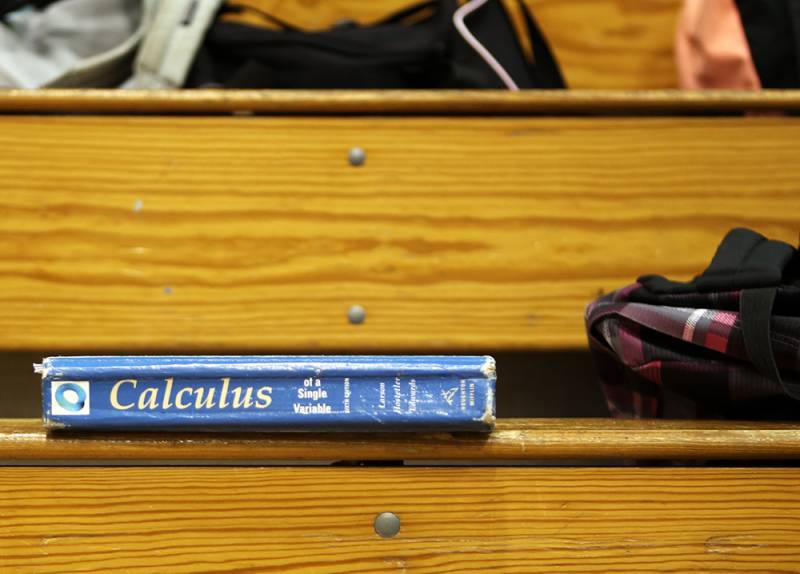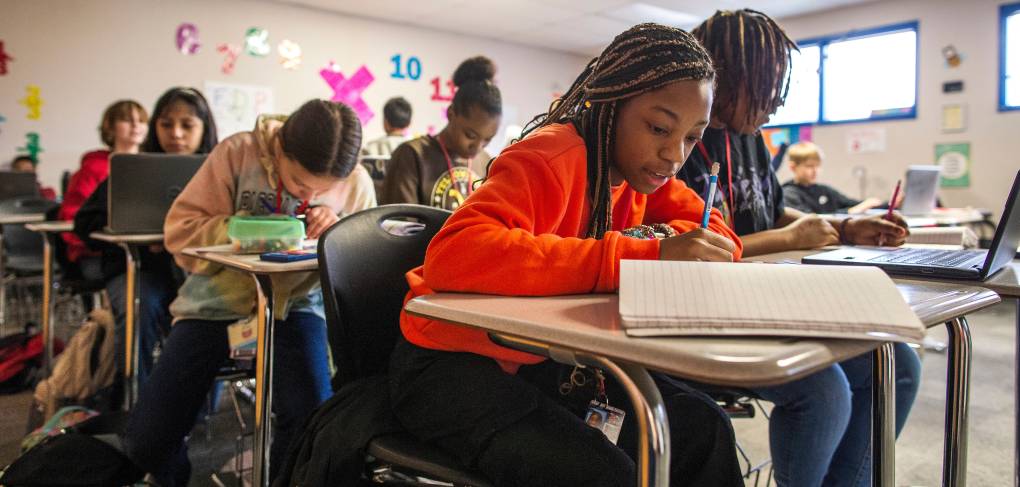AB 1705, signed into law in 2022, requires the college system to evaluate the impact of enrolling students in prerequisites to calculus and, if they can’t prove students benefit from those classes, to stop requiring or even recommending them.
Some backers of the law interpret it as mandating a shift as much as possible to enrolling all STEM students directly into calculus. They cite a section that states students “shall be directly placed into” the transfer-level class that satisfies the requirement for their degree.
Chancellor’s office officials, however, maintain that the latest guidance is consistent with the law. “The guidance is fully within the parameters of AB 1705,” Paul Feist, a spokesperson for the system, said in an email.
Under the new guidance, students who didn’t pass Algebra II or its equivalent in high school will be allowed to take two semesters worth of calculus prerequisites, which could include some combination of college algebra, trigonometry or precalculus. Students who did pass that course but not trigonometry or precalculus will be allowed to enroll in a one-semester prerequisite course, typically precalculus.
The new guidance is a compromise, said Pamela Burdman, executive director of Just Equations, a nonprofit organization focused on the role of math in education equity.
“I think the chancellor’s office is trying to strike a balance here,” she added. “I do think there has been a tendency to place students in more prerequisites than they may need, but we don’t know enough from the research exactly what the optimal placement system is and how to identify which students need which levels of support.”
The guidance won’t be the final word on the issue. It could face a future legal challenge. Jetaun Stevens, an attorney with the civil rights law firm Public Advocates, said the chancellor’s new directive urges colleges “to violate the law.” Stevens said the firm is still “assessing what we can do” and did not rule out a lawsuit.
“This guidance gives colleges permission to completely ignore students’ rights to be placed in calculus. It creates exceptions in the law that don’t exist,” Stevens said. “This is illegal and beyond the chancellor’s office’s authority. They don’t get to pick what part of the law they want to enforce.”
Faculty, meanwhile, still plan to pursue legislation next year that would permanently clarify that colleges can offer “standalone foundational pre-transfer courses,” according to a memo being circulated by the Faculty Association for California Community Colleges, a faculty advocacy organization. Wendy Brill-Wynkoop, president of the association, said the draft is being “shared widely with system partners and legislators.”
In the meantime, starting next year, the chancellor’s office plans to collect data from each college and examine how students are accessing calculus. Colleges will have to prove that students are at least as likely to get to and complete calculus when they start in prerequisites as when they start right away in calculus. If the prerequisite path shows worse results, guidance says those prerequisites will need to be eliminated for STEM majors by 2027.
The updated guidance is “simple and based in common sense,” said Tina Akers-Porter, a math professor at Modesto Junior College and one of the leading critics of the original guidance. “If you’ve taken the preparatory courses, then go into calculus. But if you haven’t, then still offer the preparatory courses. That’s what we wanted.”
Tammi Marshall, dean of math, science and engineering at Cuyamaca College, was disappointed in the chancellor’s office’s new direction. She said the chancellor’s office has previously “done a great job of holding the colleges accountable” to evidence suggesting students perform better when placed directly into calculus with a companion support course than in longer sequences of preparatory courses. Her college has been highlighted as an early adopter of AB 1705 and has reported improved calculus completion rates across racial groups.
“I felt like they were pressured into making a decision that isn’t completely based on the data,” she said of the new guidance.
Some math faculty said the new guidance leaves departments little time to adapt and may sap energy from attempts to reimagine math courses ahead of next fall. Many departments have designed new classes to prepare students for calculus in anticipation of AB 1705, but it’s unclear whether colleges will choose to offer those courses next fall, as they initially planned, or fall back on older courses.
“We just don’t know where to focus our energy right now,” said Rena Weiss, a math professor at Moorpark College, adding that she’s glad the chancellor’s office listened to faculty members’ concerns and is grateful for the option to place STEM students into courses like trigonometry.
Other faculty are hoping for more information about exactly which students they can now place into precalculus courses.
Forecasts of what the guidance means for access to STEM education varied. Marshall predicted greater inequity at colleges that opt to continue calculus prerequisite sequences with high attrition rates, which she said have a “disproportionate impact on our Black and brown STEM students.”
On the other side, Southwestern College math professor Kimberly Eclar said this week’s guidance gives more options to students whose high schools do not offer higher math classes. James Sullivan, a math professor at Sierra College, said the updated rules will benefit students who transition into a STEM career later in life but haven’t yet learned the concepts they’ll need for calculus.
Hetts, the executive vice chancellor, said the current evidence is simply “not strong enough” to prohibit colleges from offering prerequisites next year. The chancellor’s office, in consultation with the RP Group, a nonprofit that conducts research on behalf of the college system, plans to conduct additional research starting in 2025 “to more thoroughly understand” how students access calculus.


